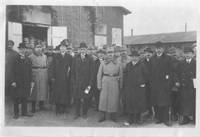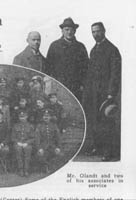Table of Contents
Key Figures
YMCA Secretaries
a | b | c | d | e | f | g | h | j | k | l | m | n-o | p | r | s | t-u | v | w | y-z
J. W. Namblard
A French YMCA secretary, Reverend Namblard was a pioneer in prisoner of war work in France. The French Army assigned Namblard to serve as a chaplain to French military and naval forces at Rochefort. By November 1914, he began to provide relief services to wounded German soldiers in the military hospital. Namblard soon expanded these operations to German prisoners of war and interned civilians in prison camps in the area, distributing Gospels and books and performing religious burials for dead prisoners. Namblard made special efforts to help POW's celebrate Christmas and Easter in the hospitals and the prison camps.
Trgyve Narvesen
A Norwegian YMCA secretary, Trgyve Narvesen volunteered to serve in the War Prisoners' Aid (WPA) program in Europe during World War I. Narvesen began work by November 1916 as a member of Archibald C. Harte's staff. He became the International Office Secretary of the WPA Office in Copenhagen by March 1917 and worked under the direction of E. G. Wilson, sending relief parcels and Association equipment to prison camps in Germany.
H. Neander
This Swedish minister volunteered to serve as a War Prisoners' Aid Secretary in Germany and arrived in Germany in October 1915. Pastor Neander was paid by the International Committee in New York and worked in prison camps until January 1916.
J. Z. Nebbergall
This YMCA secretary volunteered for service in the War Prisoners' Aid program and the Association assigned Nebbegall to work in the WPA Office in Copenhagen by February 1917. He worked under the direction of E. G. Wilson, sending relief supplies and Red Triangle equipment to prison camps across Germany.
Paul Nicolay (Pavel Nikolai) (d. 1918)
A Russian baron with large estates in Finland, Nicolay was a devout Lutheran with pietist convictions. Nicolay worked with university students and organized them into small Bible study circles in the late 19th century. Through this work, he fostered the establishment of Student Christian Unions in St. Petersburg, Moscow, Dorpat, and other university centers. In April 1899, John R. Mott visited Russia and met Nicolay with the idea that the baron could establish a Finnish Student Christian Movement. Nicolay served as Mott's guide through St. Petersburg and became close friends. Mott came to the conclusion that the baron was the ideal candidate to organize the Russian Christian Student Movement. Nicolay was a Russian representative at the World's Student Christian Federation (WSCF) Conference in Zeist, the Netherlands in May 1905 and at the WSCF Conference in Tokyo in April 1907. Mott again visited Russia in February 1909 to visit the Mayak (the Russian YMCA, established in 1900) and to meet with Russian students. The students, disillusioned by the failures of the Revolution of 1905, were receptive to Mott's mission as Nicolay had prepared the way through his Bible study circles. At the WSCF Conference in Constantinople in 1911, Nicolay addressed the situation in Russia and the growth of the Christian Student Movement. He joined Mott in visiting Sofia and Belgrade, a trip that laid the foundation for the Greek, Serbian, Bulgarian, and Romanian World Student Christian Federations. Nicolay's hard work paid off in May 1913 when Russia became the thirteenth member of the WSCF when the organization was admitted at the conference at Lake Mohonk, New York. World War I derailed the work of the WSCF, especially in Russia. Mott visited Nicolay twice during the war; in Moscow in July 1916 and during the American General Secretary's participation in the Root Mission in Petrograd in June 1917.
Gerhard Niedermeyer
A German Christian student leader, Niedermeyer supported the War Prisoners' Aid (WPA) program in Germany during World War I. When the war began, Niedermeyer was the National Secretary of the Deutsche Christlicher Studenten Vereinigung (German Christian Student Movement or GCSM). He met with John R. Mott in Berlin with Georg Michaelis, Friedrich Wilhelm Siegmund-Schultze, and other German GCSM leaders in October 1914 when the American General Secretary was making his first tour of wartime Europe. In March 1915, Archibald Harte and Christian Phildius conferred with Niedermeyer and other GCSM officials in Berlin. Niedermeyer was enthusiastic about conducting welfare work for Allied students in German prison camps. The GCSM National Secretary attended the inauguration of the YMCA hall at Göttingen in April 1915 and Harte included Niedermeyer as a member of the National Committee of the German YMCA War Prisoners' Aid Committee in May 1915. The GCSM was concerned about the welfare of German students imprisoned in Russia. The committee collected Liebesgaben (charity gifts), consisting primarily of books, and Harte developed an exchange system with the Russians to distribute these parcels. The GCSM also obtained and distributed literature for Russian, French, and English POW's in Germany, focusing especially on technical and professional books. In April 1916, Niedermeyer became a member of the Deutsches Kommitee der Kriegsgefangenenhilfe der Christlicher Vereine jünger Männer (the German Committee of War Prisoners' Aid of the YMCA) organized in Berlin under the Ministry of War, an organization which became the model for WPA operations across Europe. With Prince Maximilian of Baden, Professor Thomas Hall, Captain von Bönigk, and Conrad Hoffman, Niedermeyer became a member of the Executive Committee of this organization, which oversaw daily WPA operations. Harte and Niedermeyer worked well together; Harte believed that Niedermeyer would emerge as the new leader of the GCSM after the war. Phildius, on the other hand, argued that Harte's relationship with Niedermeyer had placed WPA operations into the hands of the German National YMCA, which weakened the effectiveness of the World's Committee in Geneva. With the Wilson administration's decision to break off diplomatic relations with Germany in February 1917 and the subsequent withdrawal of American WPA Secretaries from the empire, relations between the American and German Associations became strained. When Mott participated in the Root Mission to Russia, a crisis emerged in Germany. In May 1918, the Ministry of War decided to shut down the WPA headquarters in Berlin and appoint Niedermeyer in charge of POW relief work in Germany. The World's Committee dispatched Phildius and Adolf Hoffmann to Berlin to negotiate with the Ministry of War in June. Niedermeyer participated in the negotiations in support of the World's Alliance to allow Conrad Hoffman to maintain WPA operations. Prince Maximilian intervened in support of the YMCA and convinced General Friedrich to rescind the order. Niedermeyer continued to serve the GCSM and German students after the war.
Claus Olandt, Jr.
During World War I, Olandt served as a War Prisoners' Aid Secretary in Germany. He began working with the American YMCA in 1881, when he became the Recording Secretary for the German branch of the Association in New York City. From 1882 to 1897, Olandt worked for the International Committee serving German-speaking young men in New York. From 1896 to 1897, Olandt served as the YMCA State Secretary for New Hampshire and Vermont. He resigned from Association work in 1897, but maintained his interest in the organization. In December 1915, Olandt volunteered to work as a WPA Secretary to help Allied POW's in German prison camps and remained at work until January 1917.
Joseph H. Oldham
A Scottish evangelist and ecumenical missionary leader, Oldham first met John R. Mott in the Summer of 1891 when he guided Mott around Oxford University. They became lifelong friends and greatly advanced the ecumenical movement, student Christian work, and missionary service around the world. In 1897, Oldham served as the secretary of the Student Christian Conference in England. He became established as a leader in the British Student Volunteer Movement. The Scottish National Council of YMCA's decided to send Oldham as a secretary to Lahore, India to conduct student work. Mott and Oldham became the chief architects of the World Missionary Conference in Edinburgh in June 1910. The goal of the conference was to expand Christianity and Western culture by uniting Christians to spread the Gospel around the world. This conference laid the foundation for the International Missionary Council and the leaders agreed to plan for the establishment of this organization through the Continuation Committee, under the direction of Oldham. He also became the editor of the International Review of Missions, an influential missionary organ. The last meeting of the Continuation Committee before the war was held in The Hague from October to December 1913. In response to the outbreak of the Great War, Oldham postponed continuation work for the duration of the conflict. In the Fall of 1915, Oldham advised Mott to disavow his support for the British Fellowship for Reconciliation (FOR), a pacificist movement which called for an end to the fighting, but Oldham strongly supported Mott's decision to participate in the Root Mission in 1917 to render service to the Russian people. In April 1918, Oldham and Mott organized the Emergency Committee of the British Conference of Missionary Societies to complement the Continuation Committee with Mott as chairman and Oldham as secretary. In May 1919, the Emergency Committee addressed missionary freedom around the world and moved to facilitate common action by national missionary organizations. During the Versailles Peace Conference, Oldham worked tirelessly on behalf of German missionaries; he saved missionary properties and agreed to represent their interests at the negotiations regarding the future of the mandates. The Versailles Treaty of June 1919, however, removed German missionaries from their pre-war colonial fields, a decision which greatly upset the German missionary movement. In October 1919, through the World's Alliance for Promoting Friendship through the Churches, a pre-war movement, representatives called for the return of German missionaries overseas. Oldham met with German missionary leaders in April 1920 and the Germans expressed their anger towards Mott and the Versailles Treaty. Mott immediately worked to address these problems with the German YMCA and missionary leaders which began the process of reconciliation. In June 1920, missionary leaders met at the Crans Conference in Switzerland, which became the planning session for the establishment of the International Missionary Council. The delegates met again at the Lake Mohonk Conference in New York in October 1921 to implement the organization of the International Missionary Council. Oldham wrote the organization's constitution and became the chairman of the council. By 1929, Oldham became involved in the Universal Christian Council for Life and Work, an ecumenical movement that was the successor to the International Missionary Council. Oldham played a major role in the planning of the Oxford Conference of Church, Community, and State, which was held in 1937. This meeting led to the establishment of the World Council of Churches.

